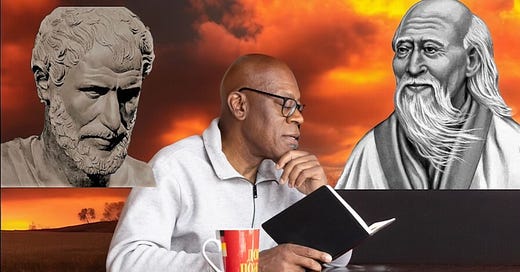In a serene garden of my own mind that transcends time and space, two great thinkers from the annals of history meet: Zeno of Citium, the founder of Stoicism, and Lao Tzu, the sage of Taoism.
This imaginary conversation between these two philosophers bridges the ancient worlds of Greece and China, exploring profound insights into the nature of self-conquest and the mastery of life.
The Garden of Tranquility
The garden is a place of harmony, where the stillness of a koi pond reflects the tranquility of the surroundings. Zeno, dressed in a simple robe, sits cross-legged on a stone bench, his eyes reflecting the wisdom of years spent pondering the nature of virtue. Lao Tzu, with his flowing beard and serene demeanor, joins him, carrying an air of effortless grace.
Zeno: (smiling) Lao Tzu, it is an honor to meet you in this timeless garden. Your teachings have long intrigued me. I have pondered your concept of the Tao and its natural flow.
Lao Tzu: (nodding) And I, Zeno, have admired your Stoic philosophy. Your idea that “man conquers the world by conquering himself” resonates deeply with the Taoist way. Tell me, what inspired this profound belief?
Zeno leans back, contemplating the journey that led him to this insight.
Zeno: My journey began in Citium, a humble town in Cyprus. As a young man, I was a merchant, but fate had other plans. A shipwreck brought me to Athens, where I discovered the writings of Socrates and other great philosophers. I realized that true wealth lies not in external possessions but in the mastery of oneself.
Lao Tzu: (smiling) Indeed, the external world is ever-changing, like the seasons. But the internal self, once understood, can navigate these changes with grace. How did you come to see self-conquest as the path to mastering the world?
Zeno: (thoughtfully) In Athens, I observed the struggles of men who sought power and wealth, only to be left unsatisfied. I came to understand that the root of their discontent was not in the external circumstances but in their inner turmoil. By aligning one's will with nature and cultivating virtues like wisdom, courage, and justice, one can achieve a state of inner peace, regardless of external conditions.
Lao Tzu strokes his beard, his eyes reflecting a deep understanding.
Lao Tzu: Your words echo the Taoist belief in wu wei, or effortless action. When we align ourselves with the Tao, we move with the natural flow of the universe, achieving harmony without force. In conquering oneself, one lets go of desires and attachments that create suffering.
Zeno: (nodding) Precisely. In Stoicism, we speak of apatheia, a state of being undisturbed by passion. It is not about suppressing emotions but understanding their nature and not being enslaved by them. This leads to ataraxia, a state of serene calm.
Lao Tzu: The Tao Te Ching speaks of the sage who “acts without doing,” achieving great things by being in harmony with the Tao. Your concept of ataraxia is akin to the stillness we seek in Taoism, where one finds peace by embracing simplicity and humility.
The conversation flows on like the gentle stream nearby, their philosophies intertwining seamlessly.
Zeno: Lao Tzu, how do you guide your followers in conquering themselves?
Lao Tzu: I teach them to observe the natural world and learn from it. The way of the Tao is to live simply, embrace humility, and practice compassion. By doing so, one can let go of the ego and its endless desires. It is in this letting go that one finds true strength and clarity.
Zeno: In Stoicism, we emphasize the dichotomy of control: focusing on what we can control—our own thoughts and actions—while accepting what we cannot. This acceptance leads to inner freedom and resilience.
Lao Tzu: Acceptance is the essence of the Tao. The wise understand that life is a series of cycles, and by flowing with these cycles rather than resisting them, one achieves harmony. Your dichotomy of control is a powerful tool for finding balance and inner peace.
As the sun sets, casting a golden glow over the garden, Zeno and Lao Tzu sit in silent contemplation, their minds united in the pursuit of wisdom.
Zeno: Lao Tzu, our paths may have begun in different lands and cultures, but they converge in the quest for inner mastery. Through self-conquest, we can navigate the complexities of life with equanimity.
Lao Tzu: (smiling) Indeed, Zeno. In conquering oneself, one conquers the world. Our journey is one of returning to our true nature, living in harmony with the world and ourselves.
In this timeless garden, the teachings of Stoicism and Taoism blend, offering a roadmap for anyone seeking to conquer the world by first conquering themselves. The wisdom of Zeno and Lao Tzu endures, guiding us toward a life of inner peace and harmony with the universe.
The Chocolate Taoist ™ is a reader-supported publication. To receive new posts and support my independent writing journey, I invite you to consider becoming a free or paid subscriber.







"the quest for inner mastery," the everpresent now.
I have followed Alan Watts since 1969.